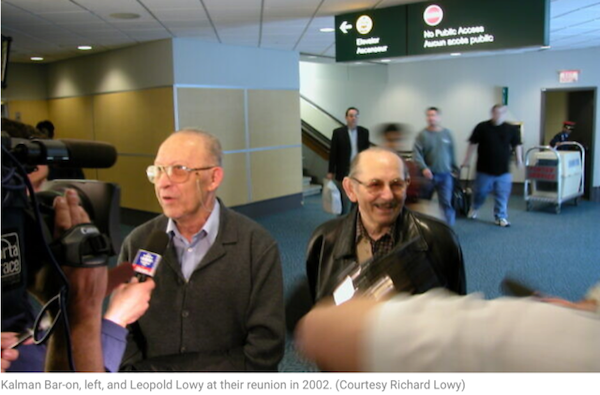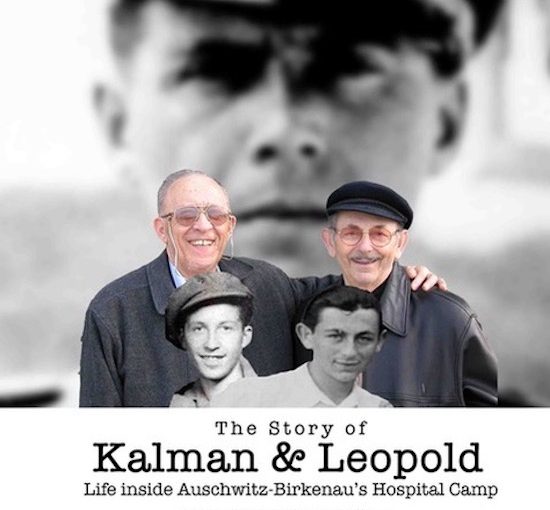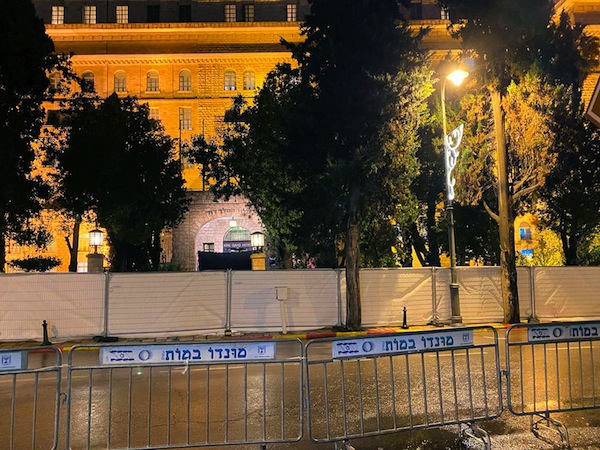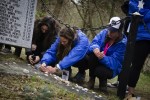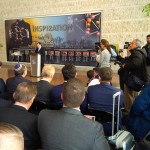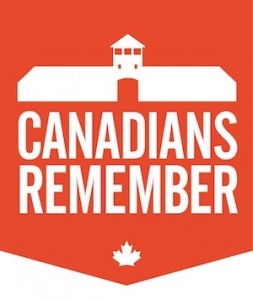Kalman Bar-On, left, and Leopold Lowy at their reunion in 2002. (photo from Richard Lowy)
An SS guard walked down the line of prisoners gathered for roll call at Auschwitz-Birkenau in 1944 and randomly picked two boys out of the line. Kalman Braun and Leopold Lowy would spend the next six-and-a-half months together working as servants in a guard shack, giving them a unique viewpoint on what was happening in that place during some of the final months of the Second World War.
The boys, who each had twin sisters and were, therefore, of interest to the infamous Nazi doctor, Josef Mengele, would survive the Holocaust, as would their sisters. Lowy moved to Canada and settled in Vancouver, Braun moved to Israel and became Kalman Bar-On – the two would not see each other again for more than half a century.
Their story was shared at the Rothstein Theatre Jan. 26, the eve of International Holocaust Remembrance Day, the 78th anniversary of the liberation of Auschwitz-Birkenau. Richard Lowy, son of the late Leopold (or Leo) Lowy, presented an immersive experience that included first-person testimony, with Richard Lowy speaking the words, variously, of Bar-On, Leo Lowy and himself, as the son of Canada’s last surviving “Mengele twin,” who passed away in 2002, just a few months after he reconnected with Bar-On. Next year, Lowy intends to release a book based on hours of interviews he did with Bar-On.
The testimony, which Lowy presented last year in a similar format in Tel Aviv, is extremely rare, he contends, because of the unique vantage point his father and Bar-On had on concentration camp operations for half a year.
“This is these two Jewish kids, 15 years old,” Lowy told the Independent before the presentation, “cleaning the [SS] barrack, staring over the shoulders of the SS guards, at the front window looking out into the camp and watching the things that are going on, the selections, the liquidation of the Gypsy camp, the uprising of Crematorium IV, which is about 100 yards away from them. They can hear the fire pit and the people screaming.”
The reunion of Lowy and Bar-On, 57 years after liberation, almost didn’t happen. Richard Lowy had produced a documentary on his father’s Holocaust experiences, called Leo’s Journey. (This film and a shorter one about the reunion are available at leosjourney.ca.) The program aired on the National Geographic Channel in Israel and Bar-On happened to see it. He didn’t recognize the older Lowy, who he knew only as “Lippa,” but when a photo of the younger Leopold flashed across the screen, Bar-On was astounded.
“He’s looking at the screen and saying, ‘It’s my Lippa, it’s my Lippa,’” Richard Lowy said. Bar-On, who credited Leo Lowy for helping him survive the Holocaust, made a few calls and, before long, the telephone rang in the Lowy condo in Richmond. By this time, Leo was experiencing some dementia and it took time for him to realize who he was speaking with.
A reunion was quickly planned and Bar-On flew to Vancouver, where TV cameras captured the emotional meeting. As Bar-On shared his recollections, Lowy’s memories were also sparked. Subsequently, the younger Lowy recorded hours of testimony at Bar-On’s home in Tel Aviv.
“Kalman has a crystal clear memory of dates, times, places,” said Lowy. “By the month, by the week, by the day, by the hour, by the minute of things that were going on.… The guards treated them like mice.”
The teenagers witnessed and overheard things that they then shared with others in their barracks, where they returned at night from the comparative comfort of the heated guard shack.
“It put them in a very unique situation, but still dangerous,” said Lowy. “Think about it. You’re in a guard shack with SS guards. You do something they don’t like, they beat the crap out of you. But they do it in such a way that they are not going to break your arm, they are not going to kill you, because you are a ‘Mengele twin.’”
The building where the boys were assigned was particularly central.
“Leopold and Kalman’s guard shack was right at the top of the camp, outside of the hospital, right beside Kanada [where valuables stolen from prisoners were stored], right beside Crematorium Number IV, and you are able to see and hear all the different comings and goings,” he said. “Kalman gives us an overview of an area of the camp, the hospital camp, that I have never really read before.”
Leopold protected Kalman by, for instance, covering for his friend at work when Kalman could not move an arm after being injected with an experimental substance.
Bar-On has provided videotaped testimony to Yad Vashem, said Lowy, but it is about 35 minutes long, like many other survivor testimonies.
“I have about 14 hours of testimony,” said Lowy, “which basically takes me back to the time he was born, what his family was like, what it was like going to the yeshivah.”
Organizations like Yad Vashem that collect survivor testimonies do not have the resources to go into the depth with each individual that Lowy did with Bar-On, he said.
“I’m not interviewing thousands of people,” he said. “I don’t see how it would be possible to get 14 hours of interviews from every single survivor. I think that would just be an incredibly difficult challenge.”
Individual stories, though, are critical to understanding the Holocaust experience, said Lowy, noting monographs written by people like Elie Wiesel and Primo Levi, the more than 100,000 hours of testimony assembled by the USC Shoah Foundation, which was founded by Steven Spielberg, and films such as Sophie’s Choice, The Pianist and Schindler’s List.
At the event last month, projected images and video footage illustrated the narrative, while Lowy spoke, accompanied by violinist Cameron Wilson and cellist Finn Manniche.
The event was presented by Ward McAllister and Michelle Kirkegaard of the development firm Ledingham McAllister, who are friends of Lowy’s and funded the production. Volunteers from Na’amat Canada helped with the logistics.

